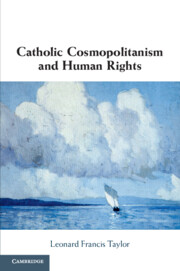Book contents
- Catholic Cosmopolitanism and Human Rights
- Catholic Cosmopolitanism and Human Rights
- Copyright page
- Dedication
- Contents
- Foreword
- Acknowledgements
- Introduction
- 1 Catholic Cosmopolitanism and the Birth of Human Rights
- 2 Catholic Cosmopolitanism from the Centre to the Periphery
- 3 Catholic Cosmopolitanism from the Periphery to International Concern
- 4 Locating a Modern Christian Cosmopolitanism
- 5 An Imperfect Cosmopolitan Project
- Conclusion
- Papal Documents Cited
- Select Bibliography
- Index
5 - An Imperfect Cosmopolitan Project
Published online by Cambridge University Press: 14 February 2020
- Catholic Cosmopolitanism and Human Rights
- Catholic Cosmopolitanism and Human Rights
- Copyright page
- Dedication
- Contents
- Foreword
- Acknowledgements
- Introduction
- 1 Catholic Cosmopolitanism and the Birth of Human Rights
- 2 Catholic Cosmopolitanism from the Centre to the Periphery
- 3 Catholic Cosmopolitanism from the Periphery to International Concern
- 4 Locating a Modern Christian Cosmopolitanism
- 5 An Imperfect Cosmopolitan Project
- Conclusion
- Papal Documents Cited
- Select Bibliography
- Index
Summary
Human rights would become instrumental in trying to resolve the tensions between religion and the modern state. Chapter 5 commences with the Irish Constitution, which illustrates how Catholic political thought would evolve as a cosmopolitan civil society project. The use of rights-based language within this Constitution was part of the trend to both restrain a newly forming nation state, while at the same time to acknowledge the limits of religion in such a new political polity. During the Cold War the Christian democratic parties consolidated and expanded European political and economic cooperation, and Section 5.2 of the chapter looks at how those who shaped that era began drawing human rights into the confrontation between Eastern and Western Europe by emphasising religious freedom. In Latin America, human rights became a distinctively different project, and Section 5.3 examines in what manner human rights was used against state authority and part of a programme of liberation and democratisation. In each of these many contexts, a cosmopolitan Catholicism presented the value of participating in the human rights project with varying degrees of success.
Keywords
- Type
- Chapter
- Information
- Catholic Cosmopolitanism and Human Rights , pp. 218 - 259Publisher: Cambridge University PressPrint publication year: 2020

